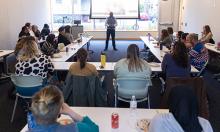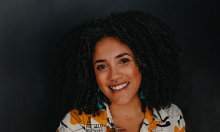Welcome by Mark Joseph
I am grateful to welcome a guest blogger to share her reflections on conversations we have been having at our impact research center about the ongoing violence in Gaza.
Colette Ngana was recently appointed as a postdoctoral scholar with the National Initiative on Mixed-Income Communities after working with us as a doctoral fellow for over a year. Our conversations have elicited a range of opinions from team members on this topic; in this blog, Colette shares her own perspectives while wonderfully conveying the consensus that emerged around the relevance of interdependence—one of our center's stated values.
Mark
Mark Joseph, PhD, is the Founding Director of the National Initiative on Mixed-Income Communities and the Leona Bevis and Marguerite Haynam Professor of Community Development at the Jack, Joseph and Morton Mandel School of Applied Social Sciences at Case Western Reserve University.
Reflections From Colette Ngana
The views expressed in this piece do not necessarily represent the views of Case Western Reserve University or the Jack, Joseph and Morton Mandel School of Applied Social Sciences.
Practicing Interdependence
Over the last year, our team at the National Initiative on Mixed-Income Communities (NIMC) has embarked on a reflective journey into the next phases of our work, which involves deepening our commitment to antiracism by practicing embodiment and intention.
Despite our decades of collective experience in building relationships through joyful learning and ‘tough’ conversations, the last six months of witnessing the war in Gaza have left our team feeling powerless, fearful and uncertain.
These are the moments when we lean on our organizational values as guides to clarity and action. NIMC is committed to interdependence, meaning we aim for collective, supportive and thoughtful decision-making and action, especially in addressing socially complex issues. NIMC also values antiracism, which rejects neutrality in the face of harm. Antiracism is a process and practice requiring vulnerability, fortitude, and persistence.
As a newer NIMC team member, I’m exploring how my knowledge of power, oppression and other obstacles to safe and dignified community building mesh with our organizational values and practices. In recent months, this exploration has taken shape in outwardly addressing the ways in which the academic community is experiencing the breaking open of harmful institutional culture(s).
In this blog, I practice vulnerability by sharing my takeaways from NIMC conversations about the historical and present-day violence exerted on Palestinians, namely the ways a seemingly distant conflict has stretched our organization to dive deeper into our value of interdependence.
Learning from others, in solidarity
Interdependence is knowing when we need support. Interdependence propels us toward connection by explicitly naming how and why we need to work together. At NIMC, early team conversations illuminated the fear of being dogmatic in our response to Gaza.
Who are we to comment when we haven’t figured it out at home?
The truth is that oppressions are global and intertwined. The systems of oppression that we work against in our communities echo in the systems enacting oppression in Gaza. Intersectional Black feminist scholars like Angela Davis and Barbara Ransby have, for decades, been steadfast in keeping these connections transparent. Yet, the current climate of academia gave us pause on what to say and how to say it. To get ‘unstuck’, we turned to each other and our thought partners.
In November, the Othering & Belonging Institute (OBI) published a blog post calling for an end to the violence in Gaza. In this post, the institute was clear that decades of systemic power imbalances derived from an Israeli apartheid state are the cause of broad military and interpersonal violence in Palestine and Israel. They also recognized that deconstructing settler colonialist practices requires embracing interdependence that proclaims, “We honor each other’s unfathomable grief, we reclaim each other’s humanity.” Bringing in other voices opened space for new discussion points, pathways for action, and space for honest conversation around concerns.
Our early team conversations were foundational because they fostered a structured space for the necessary trust building that would carry us into subsequent action. The urgency for an end to violence in Gaza cannot be overstated and slow moments of trust building are needed for social action to be sustainable. For decision-making to be interdependent, meaning collective and supportive, team members must feel a sense of trust that their limitations, concerns, ideas, and other contributions will be thoughtfully received.
More recently, practicing interdependence at NIMC means uplifting learning tools and other resources so we can continue working in the spirit of antiracist action. Interdependence has also meant acknowledging the solidarity that comes with honoring grief and humanity as valuable anchors for action. This is especially true for interpretations of student resistance and demands for social change.
The university is our community, too.
Interdependence is recognizing our responsibilities to one another and our local and global communities. NIMC is a research center within a school of social work within a university. This nested organizational structure creates complex roles and responsibilities that can be blurred when addressing equally complex social issues.
What emerged from team conversations was concern about who we are responsible to and what that responsibility looks like. What emerged for me were considerations of how interdependence means appreciating how power can limit relationships, not only with each other but also with institutions.
Universities are traditionally spaces where students, faculty, and staff can engage with radical thought and vigorous debate, but opportunities to do so in this moment are constrained. For instance, universities across the U.S. face an onslaught of restrictive legislation to reduce or eliminate diversity, equity, and inclusion in higher education. Much of this legislation follows the Supreme Court’s 2023 decision in Students for Fair Admissions v. Harvard, which ended race-based affirmative action in college admissions. In their legislation tracker, The Chronicle of Higher Education reports that 82 anti-DEI bills have been introduced since 2023 and 12 of them have become law. As a sociologist and educator, I am deeply disturbed by this trend.
For over six months, students have increased protesting at universities across the country, primarily calling for institutional divestment from organizations that support Israel. The goal is to change university culture by instituting more ethical funding streams. In their resistance, I see Gloria Anzaldúa’s testament, “I will not glorify those aspects of my culture which have injured me and which have injured me in the name of protecting me.” Student groups have also been suspended from several universities for protesting. In these demonstrations, students are drawing attention to the staggering number of Palestinian schools, universities, teachers, and professors who have been destroyed or killed and in the name of “protection.” They are looking to institutional leaders to accept that the destruction of educational infrastructures, whether in Cleveland or in Gaza, is a problem that belongs to us. We should come together in that acceptance and name that this destruction must stop.
Putting the community role of universities back into focus showcases several lessons on interdependence. First, positive interdependent relationships are harder to achieve within institutions whose policies and practices lean toward disparity rather than reciprocity. This is reflected in the inequitable use of disciplinary action in response to student resistance. Intentionality in administering of our roles and responsibilities is crucial in breaking down power imbalances that breed mistrust and resentment. Second, suspensions of student groups call into question whether or not many college campuses are fostering communities of safety, belonging, and dignity where spaces for critical conversations and social change can flourish. Lastly, universities that name antiracism, inclusion, equity, or any similar value have an obligation to act in the face of the harm that we are witnessing.
Embracing “Small is All”
Interdependence is recognizing and valuing the power of small change and connection. At NIMC, we have taken to heart the idea of ‘small is all’ outlined by adrienne marie brown in Emergent Strategy. ‘Small is all’ is the notion that society is a fractal, meaning our everyday experiences are reflections of larger, systemic structures and vice versa.
In practice, ‘small is all’ is the rippling effects of small actions that produce larger social change.
This framework has opened opportunities for NIMC team members to feel empowered to make social change where they are. As a place-based organization, NIMC’s everyday work is advancing more inclusive and equitable communities by supporting resident-informed, neighborhood-wide practices that encourage more significant shifts in institutional cultures. This emergent process that pivots on small moments with individuals and groups.
Putting ‘small is all’ into practice is more challenging when it feels as if the wave of collective action will mellow before it reaches its destination. Put differently, is what we are doing making a difference where it’s needed most urgently? Maybe.
There is sustainability in really appreciating that our global community is tied together in one way or another. What we do here matters. We will continue to ask ourselves how we can move forward so that our actions can positively affect liberation here and abroad.
Dr. Colette Ngana








